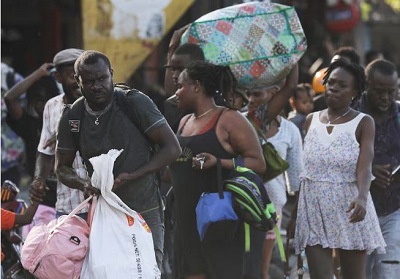United Nations, (Asian independent) Bangladesh has agreed to join an international force that will operate independently of the UN to help restore order in Haiti, which has spiralled into gang-fuelled chaos, according to a UN Spokesperson.
Bangladesh is one of the six countries that have written to UN Secretary-General Antonio Guterres that they will contribute personnel to the Multinational Security Support Mission in Haiti (MSSM), Spokesperson Stephane Dujarric said on Monday.
Invoking the UN Charter provisions for maintaining peace, the Security Council authorised the creation of the MSSM mission to help ameliorate the situation in Haiti by helping its national political force.
Having been burnt by its earlier forays into the Caribbean nation, the UN is taking a hands-off approach this time, authorising a force that will operate independently and not as a UN peacekeeping mission.
The other countries in the Kenya-led force are the Bahamas, Barbados, Benin, Chad, and Jamaica.
Bangladesh is taking a bold step in joining the mission after the catastrophic end to the previous UN mission with military peacekeepers ended in 2017 amid accusations that Nepali troops introduced a strain of cholera from South Asia that, according to the World Health Organisation, killed 9,792 Haitians and sickened more than 810,000.
The mission, known as MINUSTAH from its French initials, was ineffective in bringing peace to the country contributing to its demise.
A smaller mission without the military component that followed ended in 2019.
Armed gangs run several parts of the country, including the capital Port-au-Prince, and several thousands have perished in the violence that has destabilised the country.
More than 362,000 Haitians have been displaced by gang activity, according to the UN, and 1.4 of its 11.5 million people are threatened by famine, and four million face “acute food insecurity”.
There were few takers because of the history of ill-fated international interventions in Haiti.
Kenya finally offered to lead the mission but had to overcome court challenges within the country before it could take charge.
The latest twist in the tragic saga of Haiti, Prime Minister Ariel Henry, who fled the country in February, resigned last week while in exile in the US.
A National Transitional Council with representatives of political parties and civil society groups was immediately created with Finance Minister Michel Patrick Boisvert as interim Prime Minister to find a more enduring solution.
The assassination of President Jovenel Moise in 2021 was one of the milestones in the descent into chaos of Haiti which suffered under decades of brutal dictatorship under the Duvalier family, and after its overthrow in 1986 has gone through a military coup and violence that punctuated feeble attempts at democracy.
The UN set up an ambitious $400 million trust fund to help the victims of the cholera epidemic blamed on Nepali peacekeepers but it has collected only about five per cent of that amount.








